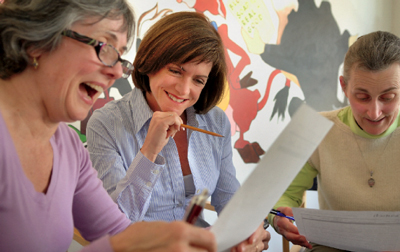In 1988, when actress Samantha Paris began a voice-over teaching business in a converted hall closet of her Mill Valley home, she had no idea her students and instructors would include some of the top voice actors in the Bay Area and L.A.
Today, 20 years later, Voicetrax is the nation’s only dedicated voice-over training academy, with more than 100 classes and workshops in everything from improvisation and auditioning to narrating audiobooks, podcasts and video games. Classes are taught at Paris’s small Sausalito recording studio/classroom, a space decorated in eye-popping colors that reflect her own vivacious and engaging personality.
In one recent session, Paris was putting students through their paces with the script of an ad for MetroPCS. The scene is an encounter between a female customer and a male clerk in a cell phone store; the clerk is trying to flirt with and bamboozle her at the same time.
Paris coached the students as they rehearsed. “You have to be more excited,” she told the woman acting as the customer. “You have to be sleazier,” she told the man playing the clerk. The two ran through the script several more times, but Paris still was not satisfied. “You need to go into the store excited,” she told the woman, “and then gradually, as you talk to the clerk, you need to show you are getting the fact that he’s trying to persuade you to keep your landline because the cell company also owns landlines.” The students recorded once more. As Paris listened to the playback she smiled. “Much better!”
While Paris teaches several Voicetrax classes herself, the majority are led by working actors and/or alumni of the school. Among them is Cynthia Songé, a casting agent whose most recent voice casting assignments include the animated film Curious George 2.
Nancy Cartwright, the voice of Bart Simpson, has taught at Voicetrax and participated in the Voicetrax lecture series Inside the Voice Actors’ Studio, which, like its unaffiliated television namesake, features a Q&A with top professionals in the field. These have also included Kevin Reher, voice casting director at Pixar Animation Studios, who led Paris’s students on a tour of the Pixar facility, and Dionne Quan, who is blind and started training with Paris when she was 10. Quan voiced the character Kimi in Rugrats; also starred in Bratz and Lilo & Stitch; and now lives in Los Angeles, where she works with scripts written in Braille.
Paris, 47, is herself a talented voice-over actress who in 20 seconds can go from the pinched speech of an adenoidal boy to the high-pitched whine of a seven-year-old girl to the Bugs Bunny voice of a child with buck teeth. Twenty years have done nothing to dampen her enthusiasm for her business. “I still love what I’m doing,” she says. “But this evolved into something much bigger than I had ever envisioned.”
Paris started as a voice actress in Los Angeles. She made good money but “always dreamed of living next to the Golden Gate Bridge,” so at 27 she moved to the Bay Area, where she participated in a panel of
voice-over experts on a local TV show. “I just happened to mention that I was teaching a little out of my house and within a week I had 1,000 calls from people who wanted to study with me,” she says.
But she wasn’t interested. “I said, ‘Look, I’m an actress. I don’t want to have a business.’ And my husband, Andre, said, ‘Just enjoy the journey and go where it takes you.’”
She did just that, all the while wondering why. “I never went to college, so all of a sudden to have a business and to have to do all that administrative stuff was difficult. For the first couple of years it was rough. It was successful, but I really needed to find the joy in it.”
Ultimately, Paris found satisfaction in knowing she was making a difference in people’s lives: “My aim is to teach them how to speak from the heart and find their voice.” Yet things haven’t always gone smoothly. An actors’ strike in 2001 cut into Voicetrax’s income, 30 percent of which comes from finding actors for commercials (the school also runs a casting agency). “Then,” says Paris, “the dot-com bubble burst and 70 percent of my own personal voice-over work disappeared, because I had been doing a lot of work for dot-com this and dot-com that. Then we had 9/11, and our economy fell into the toilet.”
She stayed afloat by operating Voicetrax from Palm Springs for a while, attracting students from Los Angeles and keeping her classes going in the Bay Area.
Ultimately, she brought her academy back with hard work and new business from a resurging Bay Area tech world. “Before,” Paris says, “voice-over work was really just television, radio, commercials, cartoons and those boring films they made us watch at school. Today, most commercials are still done in L.A. and New York, but the technology stuff —podcasting, video games, satellite radio, mobile TV, web voice work, (downloadable) audiobooks—that comes from up here. And all these new media need professional voice actors.”


